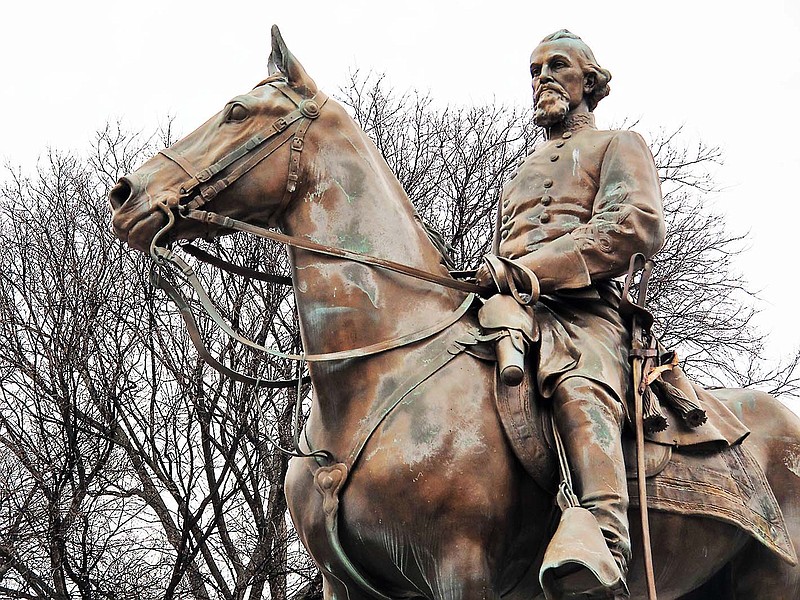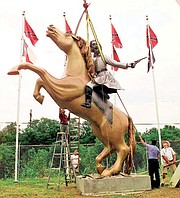View and read more
Confederate flag debate intensifies as local rally draws national attention 100 march in protest after Confederate flag removed from Chattooga courthouse Confederate flag removed from Chattooga County courthouse Photos: Confederate flag supporters rally in Fort Oglethorpe Stone Mountain hardens stance on keeping flag Photos: Confederate flag supporters rally in Fort Oglethorpe
NASHVILLE - House Majority Leader Gerald McCormick says he'll slow down his effort to remove a bust of controversial Confederate Gen. Nathan Bedford Forrest from Tennessee's state Capitol.
Citing a national wave of "hysteria" over Confederate symbols following last month's slayings of nine black parishioners at a historically black church in Charleston, S.C., McCormick said he thinks a calmer discussion is needed, not just of Forrest but related issues as well.
The man charged in the shooting, Dylann Roof, is an avowed white supremacist who posed with Confederate flags in photos. The slayings sparked a national discussion about symbols of the Confederacy that remain embedded in the Southern landscape.
McCormick, who is white, said he intends to talk about the Forrest bust when Tennessee's State Capitol Commission, on which he serves, meets July 17.
"I still do think we ought to remove the bust of Forrest from the Capitol for a number of reasons," the Chattanooga Republican said.
He noted that the bust was placed in the 1970s at a time of reaction against the civil rights movement.
"And unfortunately, Nathan Bedford Forrest was one of the great generals, but he was also a slave trader, sold human beings in downtown Memphis."
Often admired as a military genius, Forrest is easily the most famous of Tennessee's Confederate generals. But that comes with at least an equal measure of infamy. Confederate troops under Forrest's command massacred black and white Union troops stationed at Fort Pillow, Tenn., although it's still debated whether Forrest personally was responsible or simply unable to control his soldiers.
Forrest also was the first grand wizard of the original Ku Klux Klan in post-Civil War Reconstruction in Tennessee, although he later sought to disband it.
McCormick said that given Tennessee's Capitol was built primarily with slave labor, "I figure a more appropriate place for [Forrest's] bust would be particularly on a Civil War battlefield or a museum and that type thing."
Nonetheless, he said the current "hysteria" is "sort of an erasing of history that's going on and it's more of a political movement, I think, than it is a reasonable discussion of these issues."
For that reason, he said, "I will probably suggest that we delay action and go about it in a slow and methodical way."
Rep. JoAnne Favors, D-Chattanooga, who is black, said, "You cannot erase history because history is there. And because of history we want to have the statue removed."
"He committed some horrendous things after the Civil War ended," Favors said. Blacks were "slaughtered after the Civil War and he led that fight. I don't know why it would require much more methodical thought."
Favors said she recognized shortly after she was elected that the large bust in the second-floor hallway of the state Capitol near the House and Senate chambers depicted Forrest.
Photo Gallery
Citing 'hysteria' over Confederate symbols, McCormick plans to slow down his effort to remove Forrest bust from state Capitol
After that, she said, "I never looked at it."
And while she appreciates McCormick's effort and doesn't intend to get into an argument with him, "we would hope that this [bust] would go ahead and be removed."
McCormick said he understands why members of the Legislature's Black Caucus want immediate action and doesn't blame them, but is cautious of "this broader movement that seems to be going on to sort of cleanse the past."
"When it's so ridiculous they're canceling old re-runs of comedy shows on television, I think we're going too far too fast," he said.
Last week, TV Land announced it would stop running episodes of the 1970s sitcom, "The Dukes of Hazzard," in which two happy-go-lucky Southern boys tool around in a Dodge Charger with a Confederate flag painted on the roof.
"I don't want to be caught up in that silliness, and I think we need to wait until people settle down and we can have a calm, reasonable discussion," McCormick said.
Republican Gov. Bill Haslam has said he favors moving the Forrest bust, as well as removing the Confederate battle flag from state-issued license tags commemorating the Sons of Confederate Veterans. But he has emphasized he can't make those decisions on his own.
McCormick said he'll ask the State Capitol Commission for a recommendation to take to the Tennessee Historical Commission, which regulates removal of military memorials.
Debate over Confederate symbols is raging across the South. After hearing news that Chattooga County, Ga., Commissioner Jason Winters ordered the Sons of Confederate Veterans to remove its flag from the courthouse lawn, an estimated 100 residents last week marched downtown in protest.
They waved their own Confederate flags. Some yelled, "We want our flag back!" Others yelled, "Heritage, not hate!" Flag supporters have held motorcades in Chattanooga, Fort Oglethorpe and Dalton, Ga.
Tennessee state Sen. Frank Niceley, R-Strawberry Plains, who is white, said if critics are so concerned about Forrest and Confederate symbolism, other state notables' monuments ought to come down as well.
President Andrew Jackson, hero of the War of 1812, owned slaves, Niceley noted. A statue of Jackson astride a horse stands on the Capitol grounds. There's also a statue of Sam Davis, of Murfreesboro, executed by Union troops as a Confederate spy.
"And, of course, [former President] James K. Polk," Niceley said. "He's buried out there [on the Capitol grounds], I think. We'd gave to dig him up and move him.
"Albert Gore Sr., you know, he tried every way to stop the Civil Rights Bill of 1964. He had offered killer amendment after killer amendment. So I guess we ought to change the highways [names] to somebody else."
Gore famously refused to sign the 1956 Southern Manifesto declaring senators' opposition to integration, but he voted against the Civil Rights Act. The 1965 Voting Rights Act, which opened up voting for blacks in Southern states, however, won his support.
Gore's son, Al Gore Jr., was vice president under Bill Clinton and lost the 2000 presidential election to George W. Bush as a result of a controversial Supreme Court ruling.
Niceley said the problem isn't symbols of the Confederacy. It's "gun-free zones" and "fluoridated anti-depressants," pushed by major drug companies, that he said are causing psychotic reactions.
"I'd give up the Confederate flags if they'd do away with those drugs," Niceley said.
Contact Andy Sher at asher@timesfreepress.com or 615-255-0550.

